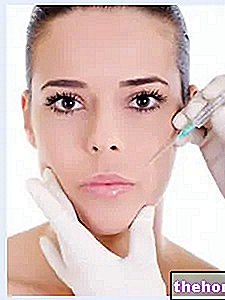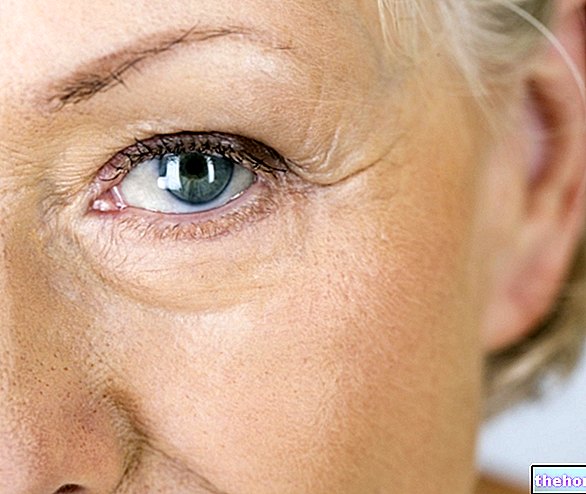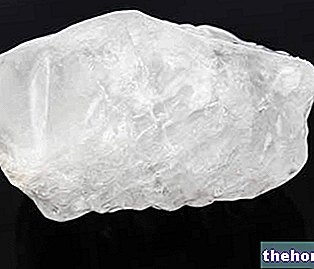What is hyaluronic acid?
Being a natural constituent of connective tissues, hyaluronic acid, by itself, does not produce evident side effects and does not present particular contraindications for use. Any side effects associated with its clinical, aesthetic and health use should therefore not be sought in the substance itself, but rather as in which it is administered.
To understand...
Hyaluronic acid is a component of the so-called fundamental substance of the dermis. Precisely, it is a glycosaminoglycan, that is a molecule formed by long unbranched chains of disaccharide units (alternation of glucuronic acid and N-acetylglucosamine).
Hyaluronic acid is used in numerous and varied fields:
-
In cosmetics it is part of the formulation of creams with an anti-aging, anti-wrinkle and moisturizing action
- In aesthetic medicine it is used as an injectable filler to correct small skin imperfections such as wrinkles, thin lips, emptied breasts, scar lesions, etc.
- In the orthopedic field, hyaluronic acid is injected intra-articularly (infiltration) for the treatment of osteoarthritis
- In the health field, the molecule is used for the preparation of anti-aging supplements to be taken orally
- In the field of ophthalmology, hyaluronic acid is used for the preparation of eye drops or ophthalmic ointments to promote the healing of the conjunctiva following a trauma
Creams with hyaluronic acid
Hyaluronic acid creams are widely used in cosmetics to prevent or improve the common signs of skin aging - such as fine lines - and to deeply hydrate the epidermis. Creams with hyaluronic acid are indicated to restore the softness and elasticity that the inexorable passage of time has avidly stolen from mature skin.
Hyaluronic acid in cosmetics is a safe, non-sensitizing and well tolerated ingredient. In this type of creams, side effects (ie skin reactions) must be sought in the entire composition of the product. Immediately after applying the cream, some people observe an unpleasant skin reaction, which can cause local redness, itching, inflammation or swelling. To avoid similar side effects, the advice is to prefer high quality cosmetics, free of sensitizing substances. or allergenic agents, such as perfumes. Hypoallergenic anti-aging creams, prepared with hyaluronic acid and safe and effective ingredients (eg coenzyme Q10, vitamin C, vitamin E, lipoic acid and allantoin) reduce the risk of side effects.
For further information: Hyaluronic acid face cream: which one to choose
Hyaluronic acid by mouth
Currently there is no news of possible significant side effects attributable to the oral intake of hyaluronic acid. Being this a natural polymer, a specific integration of hyaluronic acid (at the indicated doses) does not seem to involve any appreciable side effect.
However, the fact that oral supplementation of hyaluronic acid is a relatively modern practice limits its knowledge on possible side effects and contraindications. For this reason, it is recommended to use the supplement in full compliance with the indicated dosages and for short periods of time. excessively long.
Additionally, it is recommended that you choose oral hyaluronic acid supplements produced by bacterial fermentation and to discard those of animal origin. Let us briefly recall that until recently this type of supplement was prepared starting from hyaluronic acid extracted from the rooster's combs.
Hyaluronic acid for sale online

A 100% pure hyaluronic acid serum infused with Vitamin C, Green Tea and Jojoba Oil is available online, in a 60 ml bottle, which contains a very high concentration of pure, vegan and spa quality hyaluronic acid. Odorless, free of impurities and 100% transparent, this innovative moisture-rich product penetrates deeply into the skin layers, providing an instant hydrating boost of organic extracts and lipids. The patented blend is rich in antioxidants that protect the face from the harmful action of free radicals. Naturally free of additives, parabens, silicones, alcohol, fillers and artificial fragrances, it is also cruelty free, meaning never tested on animals.
Available online

As for the tablet formula, on the other hand, a natural hyaluronic acid supplement is available in the format of 60 capsules of 400 mg, packaged in a practical resealable package with indications in Italian. 100% Vegan and certified by the Vegan Society, it is lactose, gluten or artificial additives free and free of Magnesium Stearate, an additive found in many supplements. Useful in fighting aging and protecting the joints, this product helps reduce the signs of aging and promotes greater flexibility and joint mobility, proving to be a useful support in the presence of osteoporosis and arthritis.
For sale on Amazon
Infiltrations of hyaluronic acid
The infiltrations of hyaluronic acid are mainly indicated in the treatment of osteoarthritis of the knee and hip. Being an important component of the synovial fluid, hyaluronic acid injected intra-articularly contributes to:
- lubricate the joint
- protect the cartilage from the access of inflammatory cells
- cushion the mechanical stress to which the joint is subjected
Once again, the side effects deriving from the infiltrations of hyaluronic acid are relatively modest: when performed in full compliance with the appropriate hygiene-behavioral rules, the administration of this substance intra-articularly does not produce evident adverse effects. However, it is necessary to underline that an "eventual incorrect or clumsy injection can cause pain, redness, swelling and perception of heat in the infiltration site."
The infiltration of hyaluronic acid in the knee can sometimes induce side effects such as: pain limited to the injection site, very swollen knee and effusion of synovial fluid in the joint.
Before undergoing such therapies, patients must communicate to the doctor any sensitization or allergies to drugs or substances: the excipients used in combination with hyaluronic acid could induce systemic side effects such as hypersensitivity reactions, allergies or, in the most cases severe, anaphylactic shock.
Intra-articular infiltrations of hyaluronic acid are not recommended in case of ascertained or presumed viral or bacterial infection.
Injections of hyaluronic acid
Hyaluronic acid fillers have taken hold in modern aesthetic medicine to correct or improve some skin imperfections or imperfections. In particular, hyaluronic acid injections under the skin are mainly indicated for smoothing expression lines, filling small scar lesions and giving firmness. with thin lips and drooping cheekbones.
Similarly to the previous cases, the side effects deriving from the injections of this type of filler are related not so much to the molecule itself, but rather to the way in which it is injected.
Each filler injection carries its own risks: in most cases, immediately after the treatment, the skin reacts giving rise to phenomena such as small bruises, bruises, edema, numbness and bruises. These side effects, even if rather mild and easily reversible, can cause a non-negligible aesthetic discomfort: we remember, in fact, that in most cases, hyaluronic acid injections are performed on the face.
In more complex cases, an inexperienced physician could cause severe post-injection trauma, such as in particular persistent redness, nodules, intermittent edema, itching and even abscesses. Although these side effects are rather infrequent, the physician must always inform the patient of all the risks and dangers he could run.
Hyaluronic acid injections are contraindicated in patients suffering from severe hypersensitivity to multiple substances (severe multiple allergies).
Hyaluronic acid eye drops
Ophthalmic ointments and eye drops prepared with hyaluronic acid are reserved for the treatment of all eye diseases characterized by evident dryness (dry eye or keratoconjunctivitis sicca) or by conjunctival lesions (eg traumatic conjunctivitis). In these cases, hyaluronic acid promotes healing of the conjunctiva in a relatively short time and, by alleviating the symptoms, keeps the eye hydrated.
No adverse effects were reported with ophthalmic preparations prepared with hyaluronic acid. The possible correlated risks must rather be sought in the other ingredients that complete the formulation: it is not uncommon, in fact, that the preservatives or other excipients used in association with hyaluronic acid cause side effects such as sensitization phenomena or allergic reactions.
Pregnancy and breastfeeding
All the various forms of injection of hyaluronic acid (whether these are performed to improve aesthetics or to alleviate the symptoms of osteoarthritis) are strongly contraindicated during pregnancy or breastfeeding. This is because researchers do not have sufficiently comprehensive data on the side effects that such injections (given to the mother) could cause to the fetus or infant who feeds on breast milk.
Sponsored content: My-personaltrainer.it presents products and services that can be purchased online on Amazon and / or other e-commerce. Every time a purchase is made through one of the links on the page, My-personaltrainer.it could receive a commission from Amazon or from the other e-commerce mentioned. We inform you that the prices and availability of the products are not updated in real time and may change over time, so we invite you to check availability and price on Amazon and / or on other e-commerce mentioned.





























